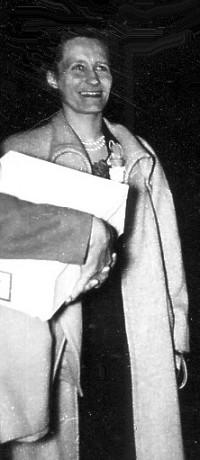Ségolène de Wendel
In every big story, there are people who contribute, but whose contributions are subsequently lost. In the Morganville-Fèves tale, somebody suggested the little French village should be a candidate for adoption. But who?
It is possible that person was Miss Ségolène de Wendel, although it seems more likely it was someone at American Aid to
France's partner in Paris. But de Wendel merits mention if for no other reason than her visit to Morganville on behalf of the
welfare of her Lorraine neighbors.
In 1704, her distant relative Jean-Martin Wendel bought an iron works in Hayange, a village about 12 miles
northwest of Fèves. By the start of the 20th century, the de Wendel family was large and rich. Ségolène Marie was born in 1908 to
Maurice Marie Ignace de Wendel, who was active in the family business, and Andrée Marie Berthe (des Monstiers Mérinville)
de Wendel.
Andrée became devoted to the welfare of the citizens of Lorraine and formed the Lorraine Union - an organization to
help the people of Lorraine - particularly those who felt compelled to leave the area. The citizens of Lorraine had suffered
greatly from the upheaval of Lorraine's separation from France and annexation to Germany in 1870 and its subsequent return to
France after WWI.
Ségolène followed in her mother’s footsteps. During World War II, she moved to Lyon and helped Lorraine refugees
living there. A principal task was facilitating the escape of Lorraine citizens who were to be conscripted into the
German work force or military.
De Wendel during her Morganville visit
She was eventually arrested and placed in detention, first in Neue Bremm prison near Saarbrücken in western Germany and later
in Fresnes prison on the south side of Paris. In both, she was tortured.
After the war, despite being in ill health due to her treatment, she returned to Hayange and immediately began working
to help the people of Lorraine recover from the effects of the war. Though she worked through such organizations as
the Red Cross, she was a strong believer in direct social action - such as the Morganville-Fèves relationship.
In May of 1949, Charles "Lafe" Todd and his wife visited Morganville and were accompanied by de Wendel. The local paper reported
about her visit:
They were accompanied by Mademoiselle de Wendel, who flew to Kansas from France where she heads the relief program
for the French government in the Moselle district of Lorraine. She will visit Feves again on her return and take our
greetings.
Miss de Wendell has the usual French charm and spoke feelingly of the trials of a subjugated country. She explained
that if the inhabitants of Feves have been slow about accepting our correspondence, it is because they are still numb
from the troubles they have been through. Most of their children are undersized from malnutrition. Practically every
home was bereaved during the war and all suffered property loss. Many, including Miss Wendell herself, spent grueling
periods in concentration camps expecting hourly to be shot. Many were. Miss de Wendell's family entertained General
Patton during the combat. She spoke of him with gratitude.
She was much interested after the speaking to talk with Lyle Bloom who had sung the Star Spangled Banner so
excellently because Lyle had been in Feves and other parts of the Metz district during the war. Lyle was glad to be
able to apologize for some of the damage done by our own soldiers in the ways of war. Lyle claims we can hardly repay
them for the milk and chickens which our own hungry boys helped themselves to.
Miss de Wendell also appreciated the Marseillaise sung in English by Ralph Lamar. It was the first time she had heard our
translation.
In Lorraine, de Wendel opened homes for the elderly, kindergartens, vocational centers for young householders away from
their homes and an open-air sanatorium for very young children. She was the honorary President of the Hayangeois section
of the National Union of Deportees and Internees.
From her obituary:
Severe strokes began in 1963, but she continued to follow the activities of the Social Action Moselle which were dear
to her heart. For her actions during the war, she was appointed a Knight of the Legion of Honor August 28, 1948. Other
awards include the Croix de Guerre in 1949; the medal of Public Health July 15, 1952; The prize of Dedication with
Vermeil Medal of the National Academy of Metz, November 26, 1964.
Until 1978, she lived at the Chateau Tournebride in Hayange. She then moved to Paris, dying three years later at the
age of 72 in 1981.


